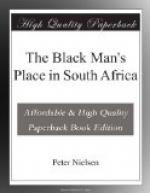One day a Zambesi woman whose husband, a petty chief, was awaiting trial for murder at my station, sent word to me asking for permission to dance that night in the compound. Surmising that there was a religious motive behind this request I gave my consent, and afterwards watched the dancing for an hour or so.
The element of rhythm in sound and movement has always been one of the chief means of exciting and expressing religious exaltation as well as sexual passion, and the two emotions merge easily in all primitive people whether they be the half-civilised moujiks of Russia, or the frequenters of modern “Revival Meetings,” or the naked Batonka on the banks of the Zambesi. The Batonka, indeed, are particularly fond of dancing to the beat of the ubiquitous drum.
The woman, who was accompanied by a few of her female friends, danced with unusual grace, and her movements were remarkably free from erotic incitation. Holding a pair of gourds in which little stones rattled not unmusically, like castanets, she gyrated in the moonlight and pirouetted on her toes with such lightness and elegance that my curiosity was roused, and the next morning I had her brought to my office and asked her to account, if she could, for the marked difference between her way of dancing and that of the rest of her people.
This is what she said: “I was very sad and my whole body was heavy. I felt ill, so I asked that I might be allowed to dance. Dancing always does me good when I feel unwell. I did not learn to dance in the way I do from anyone. I think the Great Spirit gave to me the gift of dancing, the power came down on me when I was a child. I have never seen Europeans or Arabs dancing. I have never seen an Arab dancing woman. I dance my way because the Spirit gave it to me to do so.”
I then asked her what it was that made her well. Was it the dancing or the profuse sweating which I had noticed? “The Spirit,” she said, “made me well, he gave me to dance, the dancing made we sweat thereby cooling my body, and that made me well, it brought my heart back to its right place.”
This clear expression of concatenated thought from a Native woman who had had no missionary tuition or other education of the Western kind shows to my mind sound reasoning capacity no less developed than that met with in Europeans generally.
Turning over my notes I select, at random, a few more instances to illustrate my argument.
A Tebele youth of about twenty years of age, smooth-limbed and good looking, was charged some years ago in the Rhodesian High Court with the crime of abducting two young Native girls for his own immoral purposes. I made a note of the chief part of his speech in his own defence at the time. This is what he said:




